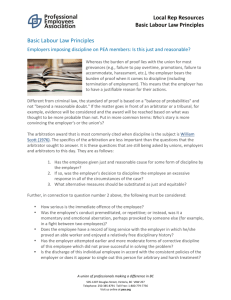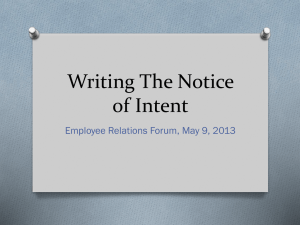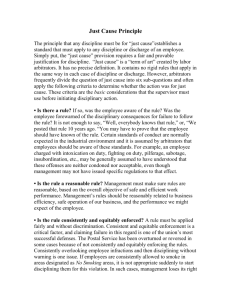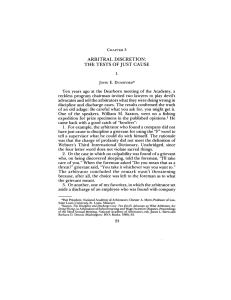the meaning of just cause - New Jersey School Boards Association
advertisement
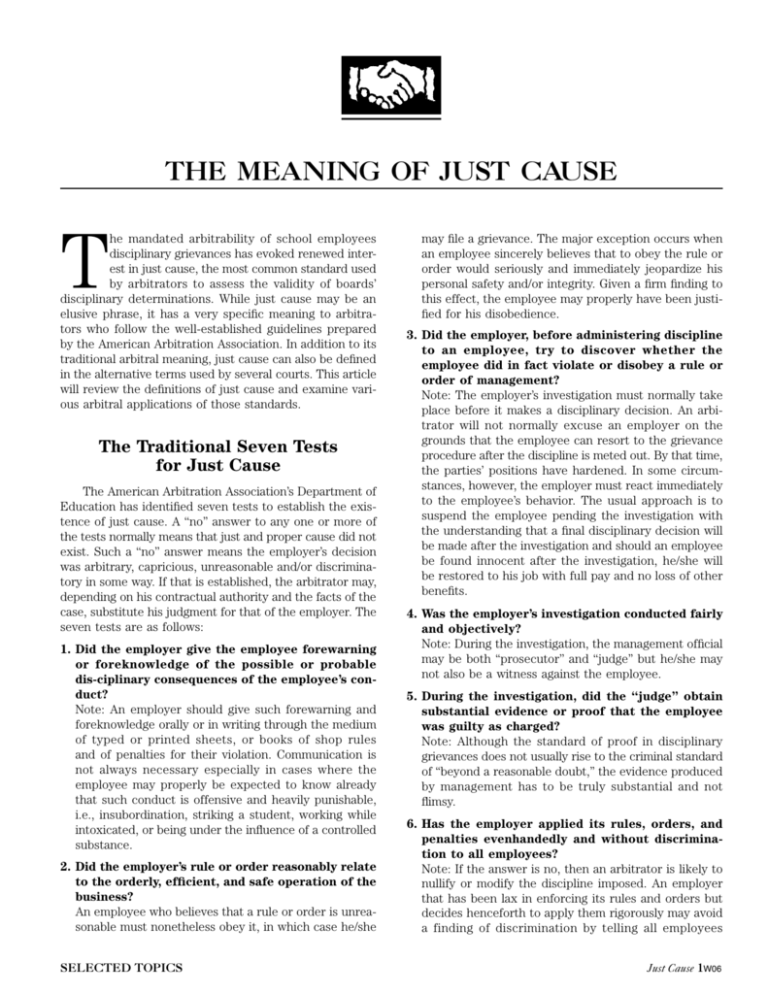
THE MEANING OF JUST CAUSE T he mandated arbitrability of school employees disciplinary grievances has evoked renewed interest in just cause, the most common standard used by arbitrators to assess the validity of boards’ disciplinary determinations. While just cause may be an elusive phrase, it has a very specific meaning to arbitrators who follow the well-established guidelines prepared by the American Arbitration Association. In addition to its traditional arbitral meaning, just cause can also be defined in the alternative terms used by several courts. This article will review the definitions of just cause and examine various arbitral applications of those standards. The Traditional Seven Tests for Just Cause The American Arbitration Association’s Department of Education has identified seven tests to establish the existence of just cause. A ‘‘no’’ answer to any one or more of the tests normally means that just and proper cause did not exist. Such a ‘‘no’’ answer means the employer’s decision was arbitrary, capricious, unreasonable and/or discriminatory in some way. If that is established, the arbitrator may, depending on his contractual authority and the facts of the case, substitute his judgment for that of the employer. The seven tests are as follows: 1.Did the employer give the employee forewarning or foreknowledge of the possible or probable dis-ci­plinary consequences of the employee’s conduct? Note: An employer should give such forewarning and foreknowledge orally or in writing through the medium of typed or printed sheets, or books of shop rules and of penalties for their violation. Communication is not always necessary especially in cases where the employee may properly be expected to know already that such conduct is offensive and heavily punishable, i.e., insubordination, striking a student, working while intoxicated, or being under the influence of a controlled substance. 2.Did the employer’s rule or order reasonably relate to the orderly, efficient, and safe operation of the business? An employee who believes that a rule or order is unreasonable must nonetheless obey it, in which case he/she SELECTED TOPICS may file a grievance. The major exception occurs­ when an employee sincerely believes that to obey the rule or order would seriously and immediately jeopardize his personal safety and/or integrity. Given a firm finding to this effect, the employee may properly have been justified for his disobedience. 3.Did the employer, before administering discipline to an employee, try to discover whether the employee did in fact violate or disobey a rule or order of management? Note: The employer’s investigation must normally take place before it makes a disciplinary decision. An arbi­ trator will not normally excuse an employer on the grounds that the employee can resort to the grievance procedure after the discipline is meted out. By that time, the parties’ positions have hardened. In some circumstances, however, the employer must react immediately to the employee’s behavior. The usual approach is to suspend the employee pending the investi­gation with the understand­ing that a final disciplinary decision will be made after the investigation and should an employee be found innocent after the investigation, he/she will be restored to his job with full pay and no loss of other benefits. 4.Was the employer’s investigation conducted fairly and objectively? Note: During the investigation, the management official may be both ‘‘prosecutor’’ and ‘‘judge’’ but he/she may not also be a witness against the employee. 5.During the investigation, did the ‘‘judge’’ obtain substantial evidence or proof that the employee was guilty as charged? Note: Although the standard of proof in disciplinary grievances does not usually rise to the criminal standard of ‘‘beyond a reasonable doubt,’’ the evidence produced by management has to be truly substantial and not flimsy. 6.Has the employer applied its rules, orders, and penalties evenhandedly and without discrimination to all employees? Note: If the answer is no, then an arbitrator is likely to nullify or modify the discipline imposed. An employer that has been lax in enforcing its rules and orders but decides henceforth to apply them rigorously may avoid a finding of discrimination by telling all employees Just Cause W06 beforehand of its intent to enforce hereafter all rules as written. 7.Was the degree of discipline administered by the employer in a particular case reasonably related to a) the seriousness of the employee’s proven offense and b) the record of the employee in his service with the employer? Note: Progressive discipline is critical in any discussion of just cause. In brief, discipline should be approp­riate to the offense and the offender. For minor offenses, discipline should be applied progressively from the minimum of oral warnings through the entire continuum of disciplinary measures, until the maximum penalty of discharge is imposed. More serious disciplinary offenses might warrant a response farther along on the continuum, and some may be so egregious as to warrant an immediate imposition of the maximum penalty. Each case must be judged on its own merits and must consider the employee’s record. The AAA notes that the employee’s record may not be used to determine guilt in the offense currently under review; however, once guilt has been proven, it is proper to use the record of previous offenses to determine the severity of the discipline. Different forms of discipline may be imposed on employees who have been found guilty of the same offense, if their records so indicate. For example, if the proven offense is a first violation for one employee, he may receive an oral or written warning while his colleague, whose record indicates a history of multiple similar offenses, may receive a more stringent form of discipline. Application of the Seven Tests Arbitrators differ in their applications of the just cause standard. Some arbitrators will apply the seven tests only if the contract specifically includes a just cause provision; others will always review disciplinary grievances in light of the seven tests regardless of the contract language. Further, arbitrators vary in the weight they will place on each of the tests and in their final finding of a presence, or absence, of just cause. Boards of education should therefore contact the NJSBA Labor Relations Department to obtain a review of the background and previous decisions of considered arbitrators before making­ their neutral selections. Boards should also keep in mind that in the arbitration­ of disciplinary grievances, the burden of proof rests with the employer. It will be up to the board’s arbitration repre­ sentative to provide sufficient evidence that the disciplinary action met the seven steps of the just cause test. Several arbitration cases are summarized below to illustrate the application of just cause to specific factual patterns. Also see the article “Preparing to Arbitrate Disciplinary Grievances” in this section of The Negotiations Advisor Online. W06 Just Cause The Case of the Association Meeting A school superintendent issued a letter of reprimand to a local association president for refusing to cancel an association meeting scheduled for 8:00 a.m. on a Monday. The president held the meeting even though the superin­tendent warned him the previous week that the meeting should be canceled because it interfered with normal school activities. The superintendent also warned the president that he would be considered insubordinate if he went forward with the meeting. Until this incident, the president had an impeccable record of 14 years of service and a good working relationship with the superintendent. The arbitrator held that the superintendent had cause to issue the reprimand. The evidence showed that ‘‘a direct and reasonable order was given and that order should have been followed.’’ The president could have followed the order and grieved later, but he failed to do this. Moreover, the record revealed that the president had other time available after the end of the regular school day to meet with the membership. The Case of the Unauthorized Leave A school district discharged a cafeteria employee with 18 years of service in the district who had good to excel­lent evaluations because she took an unauthorized leave to take a scheduled two week cruise with her husband. The employee requested an unpaid leave in November even though she made her down payment for the cruise the previous July. The employee was aware at the time she made her down payment that a teacher aide had been dismissed after taking an unauthorized leave without ever indicating that she intended to return to work. After the district denied her leave request, a union representative advised the employee to write to the superintendent indicating that she intended to return to her job after her leave was over. The superintendent did not directly respond to her letter­, even though he had a month to do so. Instead, he told the employee’s supervisor to notify her that if she took this unauthorized leave she would jeopardize her job. The supervisor failed to convey this message. The employee took the leave, was discharged, and grieved to arbitration the district’s decision to terminate her employment. The arbitrator found that cause existed to discipline the employee but that it was insufficient to warrant dis­ charge. The superintendent had a month to respond to the letter, but failed to notify the employee of the consequences of her action. For her part, the grievant first knew about the cruise in July, and about the termination of the aide’s employment. In addition, she had even dis­cussed the possibility of losing her job with her husband. Still, she took an unauthorized leave to go on the cruise. The arbitrator modified the penalty. He ordered that the discipline take the form of an unpaid disciplinary suspension to the beginning of the new school year. Under all the circum­ stances of the case, the arbitrator ruled that discharge was too severe and the employee was entitled to reemploy­ment SELECTED TOPICS effective the beginning of the following school year. (Note that in this case the arbitrator believed that the discipline should be modified inasmuch as the district’s failure to give notice to the employee that her job would be jeopardized violated the first test of just cause.) The Case of ‘‘Under the Influence’’ A custodian was discharged allegedly because he reported to work ‘‘under the influence of alcohol and drugs and was unable to perform his duties.’’ The custodian grieved the discharge and arbitration ensued. At the arbitration hearing, the principal testified that the griev­ant appeared disoriented and told the area manager to observe him. The manager testified that the grievant’s speech was slurred, his walk unsteady, and his movements slow. The grievant told the manager that he had an ear­ache and had, upon his physician’s advice, taken Darvon, a narcotic analgesic agent. The manager told the grievant to go home. The grievant refused and was discharged. Both the principal and manager testified that the ­grievant’s actions were abnormal. Yet, neither individual could definitely state that they smelled alcohol on the ­grievant’s breath. The arbitrator noted that the grievant was not given a medical examination to determine the cause of his prob­ lem. The arbitrator credited the grievant’s testimony that he became dizzy when he had taken the Darvon, and concluded that any abnormality in the grievant’s behavior ‘‘may have been caused by that drug which was prescribed­ by a physician’’ and which contained the warning that the drug ‘‘may cause drowsiness or impair one’s mental/or physical abilities; therefore, use caution when driving or operating machinery.’’ The arbitrator sustained the grievance and rescinded the discharge. This case could have been avoided altogether had there been a fair and objective investigation as well as more substantial evidence that the grievant’s behavior, as claimed by him, was a result of his taking the drug prescribed by his physician for an earache. The Case of the Missing Evidence A principal wrote a ‘‘special evaluation’’ about a teacher based on complaints from a student, a parent, and another teacher that the teacher smelled of alcohol and behaved in an unprofessional manner. The district contended that this ‘‘evaluation’’ was not a disciplinary action; the grievant was simply being put on notice that his behavior was unacceptable. The evidence disclosed that the principal never fully investigated or substantiated the charges. Nor did the district show by ‘‘clear and convincing evidence that the teacher violated any rule or policy.’’ The arbitrator found that this ‘‘evaluation’’ was a disciplinary action. Because the district produced no substantial proof that the griev­ant smelled of alcohol or behaved in an unprofessional manner, the arbitrator ordered the ‘‘evaluation’’ removed­ from the teacher’s personnel file. SELECTED TOPICS The district made several mistakes: it never made an effort to discover whether the employee violated a rule, relying instead only on the representations of three individuals; nor did the district conduct a ‘‘fair and objective investigation’’ or obtain substantial evidence of wrongdoing. In light of these faulty procedures, the district could not carry its burden of proof that it acted with just cause. A Judicial Definition of Just Cause The seven tests for just cause have been widely and traditionally accepted as standards to assess the validity of employers’ imposition of discipline. However, these tests are not the only criteria that can be used to define just cause. For example, several court decisions have defined just cause as: An adverse employment action for just cause is one based on facts that 1) are supported by substantial evidence and 2) are reasonably be­lieved by the employer to be true and also 3) is not for any arbitrary, capricious or illegal reason. This definition of just cause was utilized by an arbitrator in resolving a grievance which alleged that a board’s decision to nonrenew a basketball coach violated the contract’s just cause provision. To support its position that the board did not have just cause for the non-renewal, the association cited the court’s definition of just cause. Given the association’s definition of just cause, and the board’s position that, in accordance with County College of Morris, 100 N.J. 383 (1985), the arbitrator could not read progressive discipline into a just cause standard, the arbitrator relied on the court’s definition of just cause. The arbitrator, therefore, did not apply the traditional seven tests of just cause but applied the court’s threepronged standard. Finding that the board had substantial evidence that it believed to be true and that its decision was not marked by any arbitrary, capricious or illegal reasons, the arbitrator sustained the board’s non­-renewal decision. It is important to note, however, that an application of the traditional seven tests inquiry of just cause might have led to a different result as the board did not conduct an investigation and the coach was not given warnings of the possibilities of non-renewal. The court’s definition of just cause thus seems to place a lesser burden on an employer than the traditional standard. It does require supportive, substantial evidence and protects the employee by requiring consistent application and enforcement of the employer’s rules, factors which are intricately woven into the traditional seven tests inquiry of just cause. However, it does not appear to require proof that the employer posted its rules, conducted an objective investigation nor that the penalty was reasonably related to the offense. See, for example, Maietta v. United Parcel Servicee, 749 F. Supp. 1344, D.N.J. (1990). Just Cause W06 Arbitrators in New Jersey may well be inclined to apply­ the judicial definition of just cause since it does not involve the concept of ‘‘progressive discipline’’ implied in the seventh test of the traditional interpretation of just cause. On several occasions, arbitrators’ awards have been overturned by the courts on the grounds that their reliance on the lack of progressive discipline added a standard not included in the parties’ negotiated agreements. However, arbitrators are not likely to abandon the traditional guidelines defining just cause unless the parties to arbitration provide an alternative definition of just cause. Therefore, under a contractual just cause clause, boards that wish to focus their arbitrators away from applying the traditional seven-step inquiry, will be well advised to introduce the court’s definition as the standard to assess their imposition of discipline. Other Standards In spite of the prevalence of its application, just cause is not the only standard that can be used to determine the validity of a disciplinary action. The just cause standard, as well as its definition, is completely negotiable. Any other standards or criteria that the parties agree to include in their agreement will need to be recognized and applied by an arbitrator. Examples of other standards for the imposition of discipline may include: No employee shall be disciplined without reason. or No employee shall be disciplined arbitrarily or capriciously. Contracts can also create different standards for various types of discipline, such as: No employee shall be reprimanded or otherwise disciplined without reason and no employee shall be terminated without just cause and contracts can also create different standards for various classifications of employees, such as: No permanent employee shall be disciplined without just cause; however, probationary employees may be disciplined or terminated for failure to meet district standards or for other reasons. Creating specific standards of discipline for probationary employees is important to boards’ ability to preserve their flexibility and to ensure the intent of a trial employment period. Without this careful distinction, a general just cause clause that applies to all employees covered by the contract may be read to apply to probationary employees who are part of the bargaining unit. County College of Morris, 100 N.J. 383 (1985). See Scotch Plains-Fanwood Board of Education, 139 N.J. 141 (1995), where the court held that, in the absence of a contractual standard, it is reasonable for an arbitrator to apply the well-settled just cause standard to assess the merits of a disciplinary action. W06 Just Cause Boards negotiating standards for the imposition of discipline must carefully assess the implications of the contemplated criteria on the schools’ administration. These negotiated agreements place an obligation on school management that will be enforced through mandated bind­ing arbitration. Limitations on the Applicability of Just Cause Just cause is a test which is reserved to measure the appropriateness of employers’ imposition of discipline. It cannot be used to measure the appropriateness of an employer’s evaluation of employee performance nor can it be applied to assess employers’ actions that do not involve discipline. Further, a number of court decisions have held that, in and of itself, a just cause provision cannot be an automatically applied to standard to review boards’ decisions to not renew a fixed term contract or to terminate employment in accordance with the terms of an individual employment contract. Just Cause and Nonrenewals A just cause standard may not always be an applicable standard to assess a board’s decision to not renew an individual’s employment. In Wayne Township Board of Education, the court determined that, absent an explicit and specific negotiated provision that granted employees a guarantee of continued employment , a just cause clause could not confer a right to employees on fixed-term annual contracts to arbitrate a decision to not renew their employment with the district. Under those circumstances, the court held that a just cause clause only confers a contractual right to grieve a board’s employment decision during the term of the employment contract. In other words, the court ruled that a just cause clause did not offer protection beyond the term of the fixed contract. Boards will be wellserved by reminding arbitrators of case law’s limitations on the applicability of a just cause clause. Just Cause and Midcontract Terminations Similarly, a just cause standard may not always be an applicable standard to assess a board’s decision to terminate a fixed-term contract. In both Northvale Board of Education and Pascack Valley Regional the courts found See, for example, Middlesex County Board of Social Services, PERC No. 92-93, 18 NJPER 23065. Wayne Township Board of Education, App. Div. Docket No. A-274997T5, decided Jan. 19, 1999, certif. den. 3/31/99. Northvale Board of Education, App. Div. Dkt No. A-2778-04T2, decided October 25, 2005; Pascack Valley Regional Board of Education, App. Div. Dkt. No. A-2599-04T5, decided October 25, 2005. Note: these decisions have been appealed to the N.J. Supreme Court. SELECTED TOPICS that terminations based on the provisions of an individual employment contract were different from other types of discharges. The courts held that negotiated contracts and individual employment contracts gave boards two options to discontinue employment during the life of a contract: 1) the individual employment contract gave boards the right to terminate employment upon providing the stated notice of intent; and 2) the negotiated contract authorized boards to discharge employees for just cause. The courts further held, that unless specifically and expressly stated in the negotiated agreement, a decision to terminate under an individual contract was not subject to the negotiated just cause standard. In these decisions, the court also held that absent specific authorization in the collective negotiations agreement, terminations in accordance with individual employment contracts are not contractually arbitrable. As such, boards that are faced with unions’ attempts to pursue arbitration of these decisions should petition the courts to enjoin arbitration of the grievance. Keep in mind, however, that a January 2006 amendment to the PERC Law may affect courts’ interpretations of the scope of contractual arbitrability. The new amendment imposes a presumption in favor of arbitration when there are doubts in the interpretation of a negotiated contract’s scope of arbitrability. How this new law will affect the courts’ review of petitions to enjoin arbitration remains to be seen. Developments in this area will be posted on the Labor Relations page of the NJSBA’s web page at www. njsba.org and will be included in The Negotiations Advisor Online. SELECTED TOPICS Summary The just cause standard is the most widely recog­nized arbitral standard in assessing the reasonableness of disciplinary determinations. Although a finding of just cause will depend on whether the arbitrator applies the traditional seven tests or the court’s definition of the components of just cause, both just cause definitions examine the employer’s action to establish proper and sufficient reasons and protection of the employee’s rights. Other standards for imposing discipline can also be negotiated by the parties. Under any circumstances, these standards will be used by an arbitrator to determine whether an employee was disciplined properly. Proper discipline requires that, except in discharge cases, discipline ensures that employees will correct their unacceptable behavior; except in extreme cases discipline should be corrective rather than punitive. Proper dis­cipline requires that employees know what is expected of them so they can behave according to expected standards of conduct. Proper discipline also requires that it be administered in a fair, even-handed, and objective fashion which respects both management and employee rights. Just cause does not mean that school boards and their administrators should ‘‘look the other way,’’ be lax in their enforcement of established rules or policies, or be weak in their dealings with employees and unions. Rather, boards and administrators in regard to these matters should be consistent, predictable and, above all, possess the courage to discipline employees when they have cause to do so. Just Cause W06

